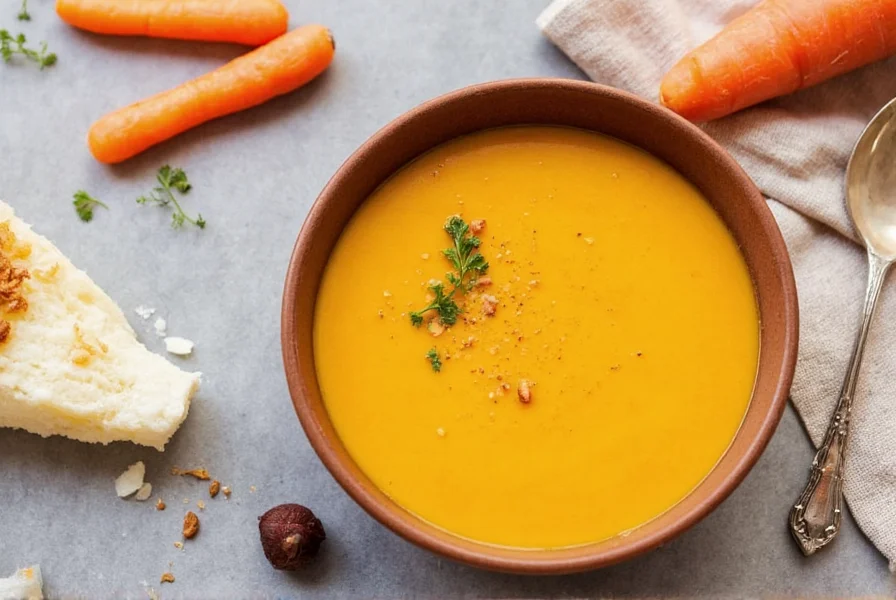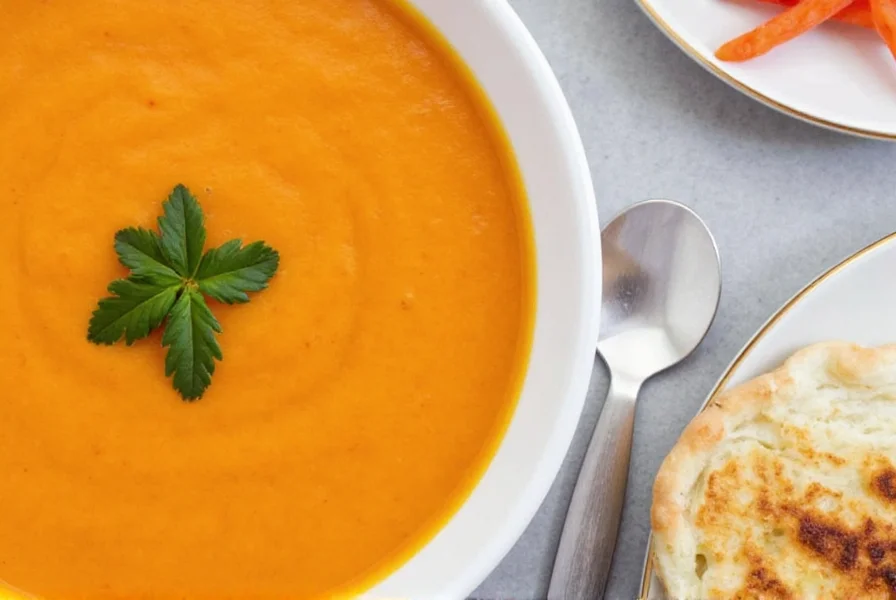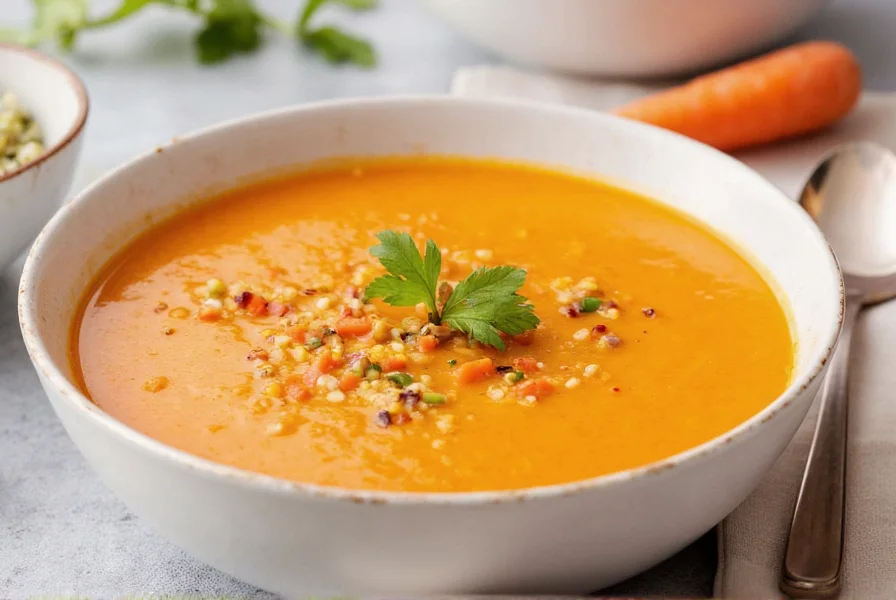Ginger carrot soup has become a staple in health-conscious kitchens worldwide, and for good reason. This vibrant orange creation combines the natural sweetness of carrots with the warming spice of ginger to produce a dish that's both comforting and nutritionally powerful. Whether you're looking for an immune-boosting meal during cold season or a simple weeknight dinner that feels special, this versatile soup delivers on multiple fronts.
The Origins of Ginger Carrot Soup
While carrot-based soups have existed for centuries across various cultures, the specific combination of ginger and carrots gained popularity as global culinary traditions merged. Carrots themselves originated in Central Asia and were initially purple or yellow before Dutch growers developed the orange variety we know today. Ginger, native to Southeast Asia, has been used medicinally and culinarily for over 5,000 years. The pairing of these two ingredients creates a synergistic effect where the bioavailability of nutrients from both is enhanced.
Nutritional Powerhouse: Health Benefits Explained
The health benefits of ginger carrot soup extend far beyond its delightful flavor profile. Each primary ingredient contributes unique nutritional advantages that work together to support overall wellness.
| Ingredient | Key Nutrients | Primary Health Benefits |
|---|---|---|
| Carrots | Vitamin A (beta-carotene), Vitamin K1, Potassium, Fiber | Supports vision health, boosts immune function, promotes healthy skin |
| Ginger | Gingerols, Antioxidants, Magnesium, Potassium | Reduces inflammation, aids digestion, alleviates nausea |
| Garlic (common addition) | Allicin, Manganese, Vitamin B6, Selenium | Supports cardiovascular health, enhances immune response |
When prepared properly, ginger carrot soup becomes more than just a meal—it transforms into a functional food that actively supports your body's natural defenses. The vitamin A from carrots plays a crucial role in maintaining mucosal barriers in the eyes, respiratory tract, and gut, which function as the body's first line of defense against pathogens. Meanwhile, ginger's anti-inflammatory compounds help reduce oxidative stress throughout the body.
Perfecting Your Ginger Carrot Soup Recipe
Creating an exceptional ginger carrot soup requires attention to ingredient quality and cooking technique. The following recipe yields four generous servings and can be easily scaled up for meal prep.
Essential Ingredients
- 1.5 pounds (680g) carrots, peeled and chopped
- 2-3 inch piece of fresh ginger, peeled and grated (adjust to taste)
- 1 large onion, diced
- 3 cloves garlic, minced
- 4 cups (950ml) vegetable broth (low sodium preferred)
- 2 tablespoons olive oil or coconut oil
- 1 medium apple (optional, for natural sweetness)
- Salt and freshly ground black pepper to taste
- Fresh cilantro or parsley for garnish
Step-by-Step Preparation
- Heat oil in a large pot over medium heat until shimmering but not smoking.
- Add onions and sauté until translucent (about 5 minutes), stirring occasionally.
- Incorporate garlic and grated ginger, cooking for 1-2 minutes until fragrant—be careful not to burn.
- Add chopped carrots (and apple if using) and stir to coat with aromatics.
- Pour in vegetable broth, ensuring ingredients are fully submerged.
- Bring to a gentle boil, then reduce heat to low, cover, and simmer for 25-30 minutes until carrots are fork-tender.
- Remove from heat and allow to cool slightly before blending.
- Using an immersion blender or regular blender (in batches), puree until completely smooth.
- Return to low heat, season with salt and pepper, and adjust consistency with additional broth if needed.
- Serve hot with fresh herb garnish and optional toppings.

Customizing Your Soup Experience
One of the beauties of ginger carrot soup is its adaptability to various dietary preferences and flavor profiles. Consider these modifications to suit your needs:
Dietary Adaptations
- Vegan creaminess: Add 1/4 cup coconut milk at the end for a dairy-free creamy texture
- Extra protein: Stir in cooked lentils or white beans before serving
- Lower carb version: Reduce carrots by 25% and add cauliflower florets
- Spice variations: Add a pinch of cayenne or turmeric for additional health benefits
Flavor Enhancement Tips
Professional chefs often employ these techniques to elevate simple soups:
- Dry roasting: Toss chopped carrots with oil and roast at 400°F (200°C) for 20 minutes before adding to soup for deeper caramelized flavor
- Aromatic layering: Add a strip of orange zest during cooking for subtle citrus notes that complement the ginger
- Acid balance: Finish with a squeeze of fresh lemon juice to brighten flavors
- Texture contrast: Top with toasted pumpkin seeds or croutons for satisfying crunch
Storage and Reheating Guidelines
Ginger carrot soup is excellent for meal preparation. When stored properly in airtight containers:
- Refrigerator: Keeps well for 4-5 days
- Freezer: Maintains quality for up to 3 months
- Reheating: Warm gently over medium-low heat, adding small amounts of broth or water if needed to restore consistency
Interestingly, the flavors often deepen and improve after 24 hours as the ingredients continue to meld. This makes it an ideal make-ahead dish for entertaining or busy schedules.

Troubleshooting Common Issues
Even simple recipes can present challenges. Here's how to address frequent ginger carrot soup problems:
- Soup too thin: Simmer uncovered for additional 10-15 minutes to reduce liquid, or add small amounts of cooked rice or potato to thicken
- Soup too thick: Gradually incorporate additional broth or water while reheating
- Overpowering ginger: Balance with a small amount of honey or additional carrots, or add a splash of citrus
- Lack of depth: Enhance with a teaspoon of miso paste or a Parmesan rind simmered in the broth
- Grainy texture: Ensure thorough blending while soup is still hot, or strain through a fine mesh sieve for ultra-smooth results
Perfect Pairings: What to Serve with Ginger Carrot Soup
This versatile soup complements various accompaniments:
- Bread options: Crusty whole grain bread, garlic naan, or seed crackers
- Protein additions: Grilled chicken, baked tofu, or a soft-boiled egg
- Salad pairings: Simple arugula salad with lemon vinaigrette or shaved fennel salad
- Additional toppings: Greek yogurt, toasted coconut flakes, or a drizzle of chili oil
For a complete meal, consider serving ginger carrot soup as a starter before roasted chicken or grilled fish with seasonal vegetables.
Frequently Asked Questions
Can I make ginger carrot soup without a blender?
Yes, you can make a chunky version by finely dicing all ingredients and simmering until very tender. However, the smooth texture achieved through blending creates a more refined dining experience and better flavor integration. If you don't have a blender, consider mashing the cooked vegetables thoroughly with a potato masher for a rustic alternative.
How can I adjust the spiciness of ginger carrot soup?
Control the spiciness by adjusting both the amount and preparation of ginger. For milder flavor, use 1-2 inches of ginger and add it later in the cooking process. For more heat, use 3-4 inches and add it earlier. You can also remove the ginger after cooking if the soup becomes too spicy. Remember that fresh ginger provides more heat than dried, and grating releases more flavor compounds than slicing.
Is ginger carrot soup suitable for weight management?
Ginger carrot soup can be an excellent addition to weight management plans when prepared with minimal added fats. One cup typically contains 100-150 calories, is high in fiber from the carrots, and the ginger may help with digestion and metabolism. The high water content and fiber promote satiety, helping you feel full with fewer calories. For best results, avoid adding excessive coconut milk or cream, and pair with protein sources for balanced nutrition.
Can I use frozen carrots for ginger carrot soup?
Yes, frozen carrots work well in ginger carrot soup, especially when fresh carrots aren't available. Thaw them slightly before use for more even cooking. The texture may be slightly softer than fresh carrots, but the flavor difference is minimal. Frozen carrots are often flash-frozen at peak ripeness, preserving nutrients. For best results, avoid using pre-seasoned frozen carrot blends that may contain added sugars or sauces that could alter your soup's flavor profile.
How long does homemade ginger carrot soup last in the refrigerator?
Properly stored in an airtight container, homemade ginger carrot soup maintains freshness for 4-5 days in the refrigerator. The acidity from any added citrus can help preserve it slightly longer. Always cool the soup completely before refrigerating, and store it in portions for easy reheating. When reheating, ensure the soup reaches 165°F (74°C) for food safety. For longer storage, freeze in portion-sized containers for up to 3 months.











 浙公网安备
33010002000092号
浙公网安备
33010002000092号 浙B2-20120091-4
浙B2-20120091-4